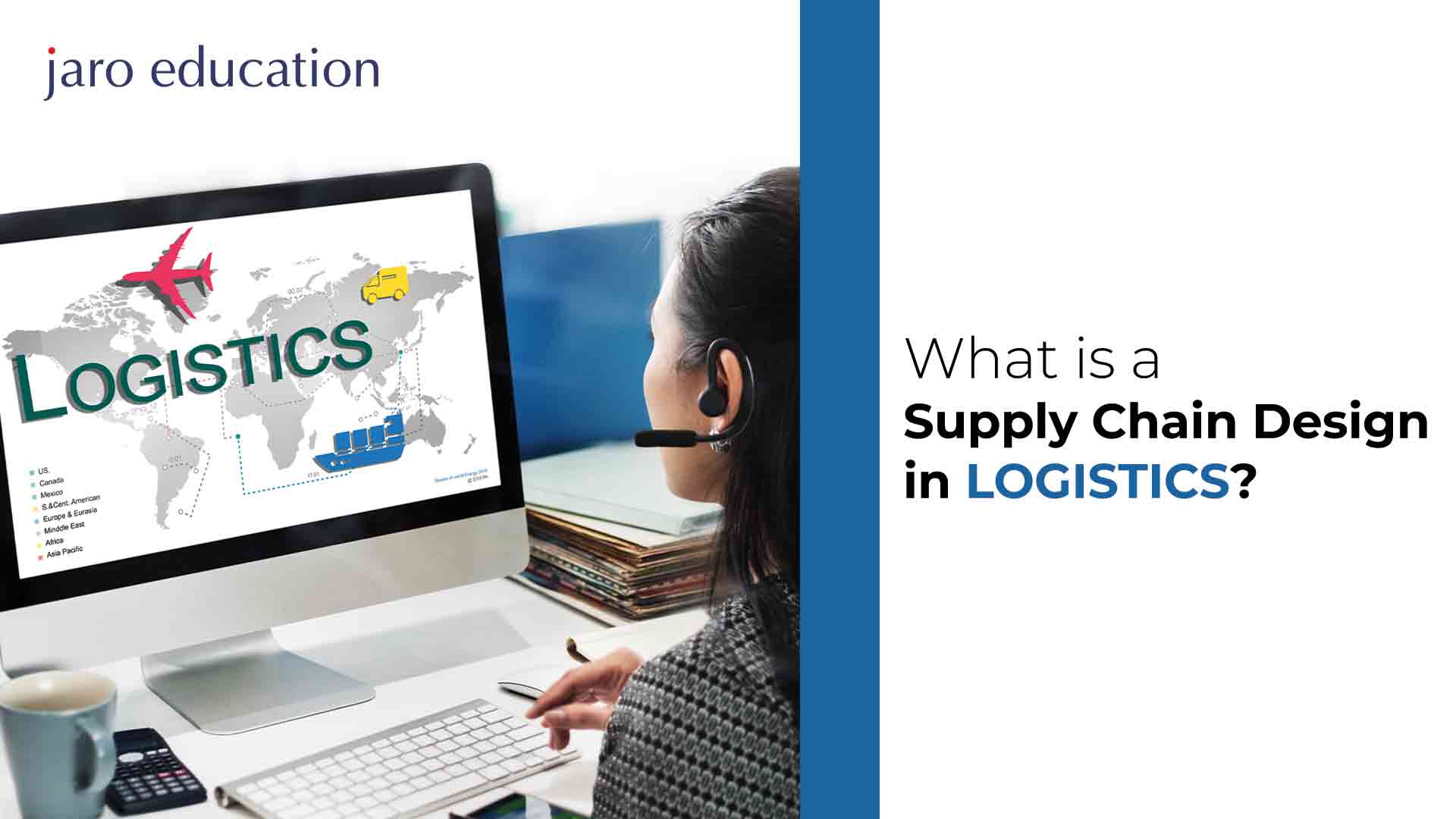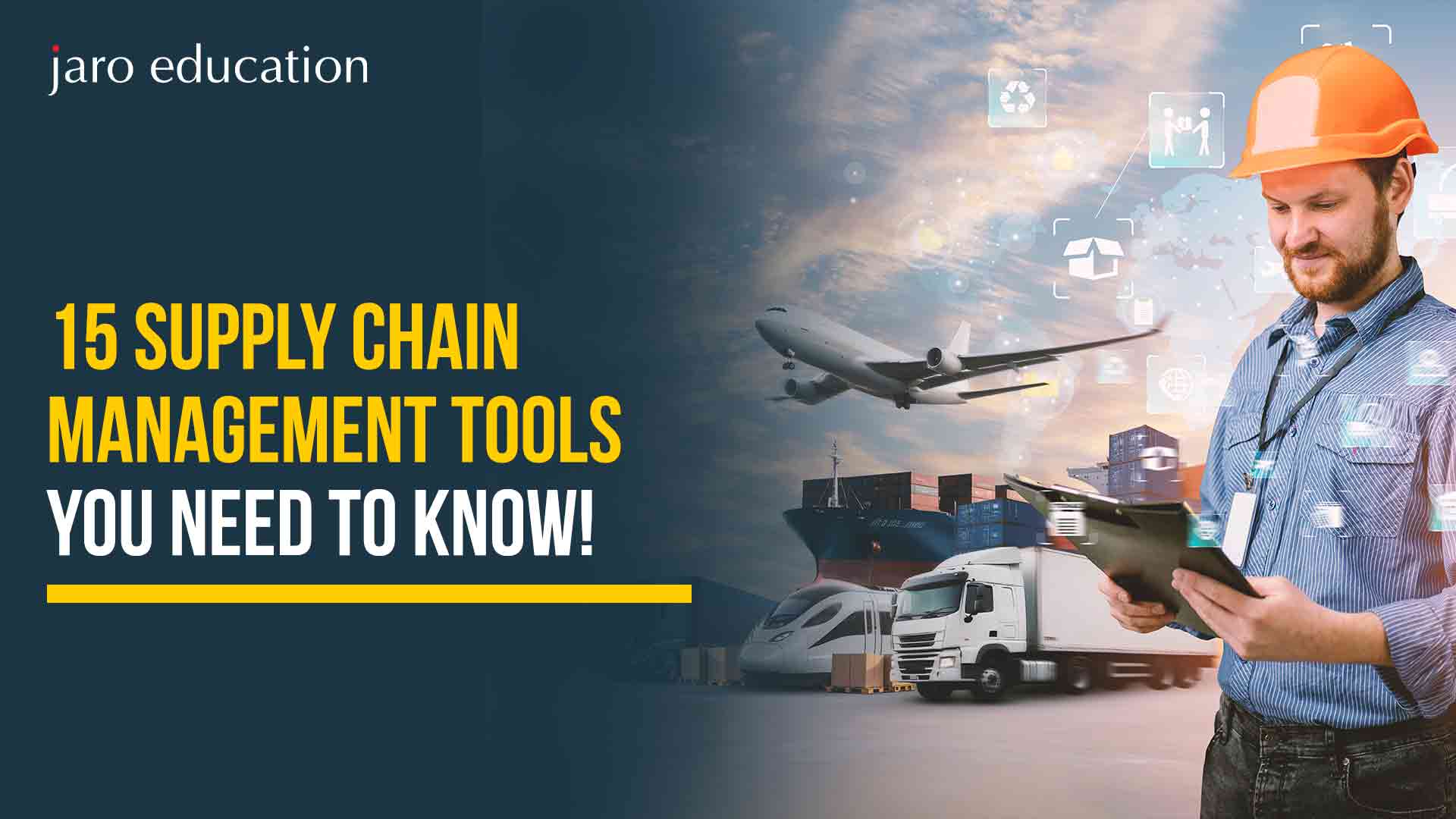Seize E-Supply Chain Management: A Skill for Modern Businesses
Table of Contents
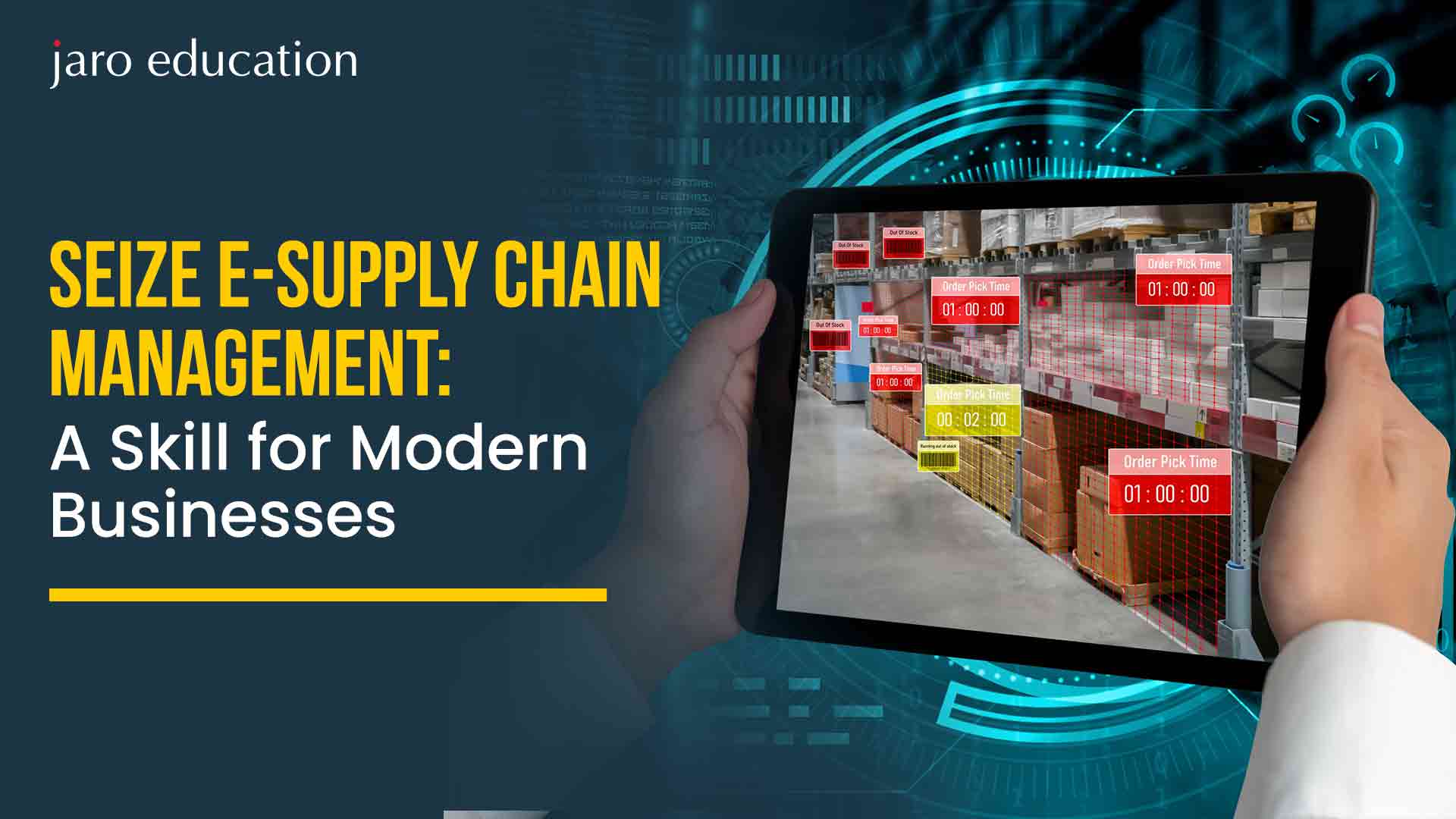
- jaro education
- 29, November 2024
- 11:00 am
Ever ordered a pair of shoes online at midnight and had them delivered to your doorstep the very next day? It feels almost magical, doesn’t it? Yet, behind this seamless experience lies an intricate web of logistics, technology, and analytics – all working harmoniously to ensure that businesses deliver on their promises. This marvel is made possible by e-supply chain management, a transformative approach reshaping how companies operate in today’s fast-paced, digital world.
From the rise of global e-commerce giants to the growing role of technology in logistics, e-commerce and supply chain management has become a critical driver of business success. Let’s delve into what makes e-supply chain management such a game-changer, explore its challenges, and discover why now is the perfect time to upskill with a specialised programme in supply chain management and analytics.
What is E-Supply Chain Management?
At its core, e-supply chain management integrates digital tools, automation, and data to streamline the flow of goods and services. It eliminates inefficiencies of traditional supply chains, making operations faster, smarter, and more customer-focused.
A well-oiled e-commerce supply chain isn’t just about moving products from A to B; it’s about creating a competitive edge through agility, cost reduction, and exceptional service.
The Role of Technology in Modern Supply Chains
Technology has become the backbone of e-commerce and supply chain management. Here are some tools revolutionising the space:
| Technology | Impact on Supply Chains |
|---|---|
| Artificial Intelligence (AI) | Enhances demand forecasting, inventory planning, and route optimisation. |
| Blockchain | Provides transparency and trust through immutable transaction records. |
| Internet of Things (IoT) | Enables real-time tracking of shipments and monitoring of conditions like temperature. |
| Big Data Analytics | Identifies trends, optimises operations, and supports quick, data-driven decisions. |
| Robotics and Automation | Speeds up warehouse operations, reduces errors, and enables autonomous deliveries. |
By embracing these technologies, businesses in the e-commerce supply chain can stay ahead of the curve, providing faster deliveries, better transparency, and more personalised services.
Why E-Supply Chain Management is Crucial for E-Commerce
E-commerce has set new benchmarks for consumer expectations. Customers now demand faster delivery times, greater transparency, and hassle-free returns. To meet these expectations, companies need a robust e-commerce supply chain. Here’s why it matters:
- Speed Matters
In a world where same-day or even two-hour delivery is becoming standard, businesses need to be agile. An optimised e-supply chain ensures swift order fulfilment and last-mile delivery. - Cost Efficiency
Managing logistics, transportation, and inventory is expensive. E-supply chain tools help cut costs by minimising waste and automating processes. - Better Customer Experiences
Real-time order tracking, accurate delivery timelines, and smooth returns are now non-negotiable. These depend on a well-functioning supply chain. - Scalability
Businesses can scale their operations during peak times, like holiday sales or flash promotions, without compromising service quality.
- Speed Matters
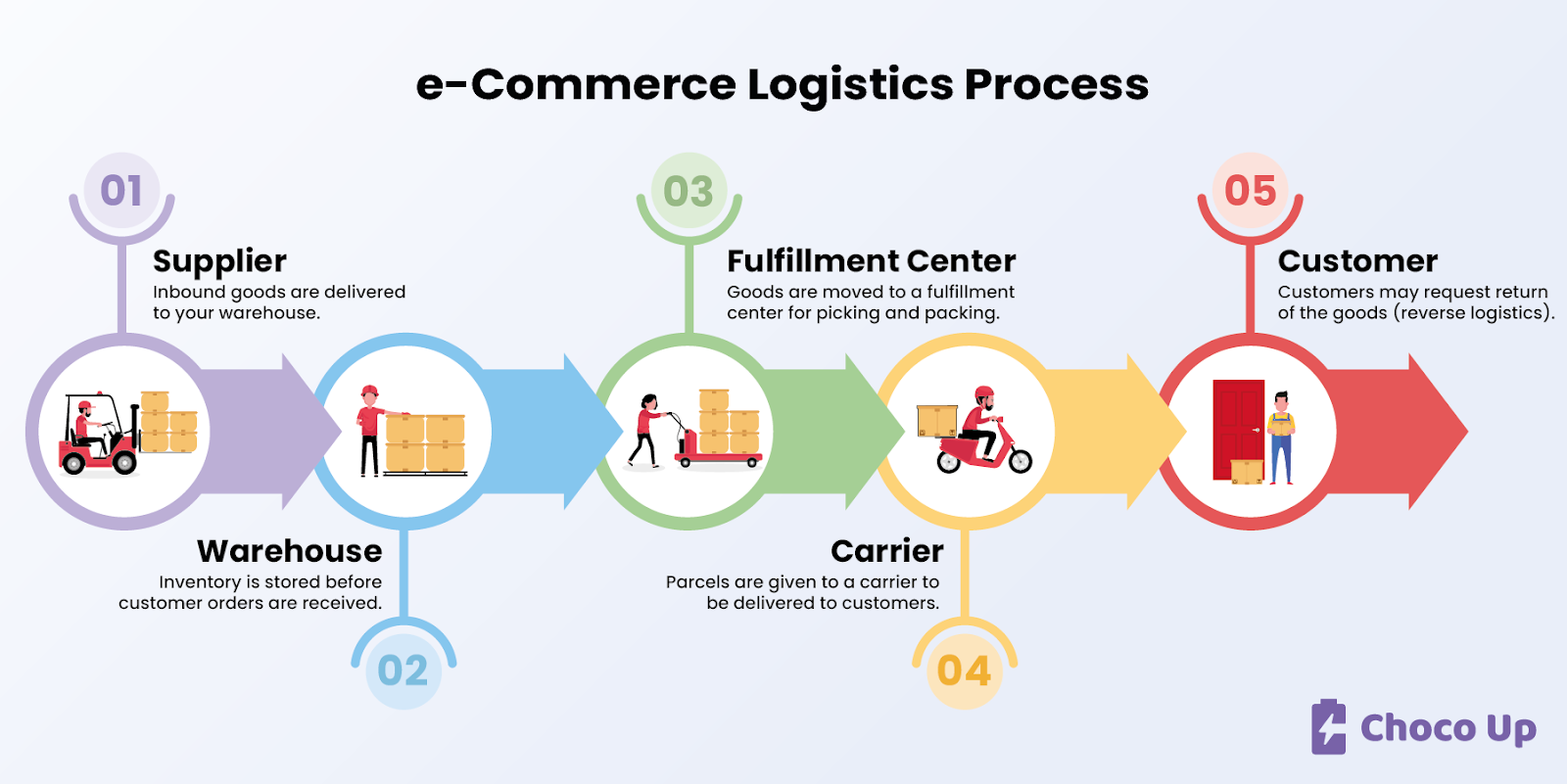
*ChocoUp
Challenges in E-Supply Chain Management
While the benefits are immense, e-supply chain management isn’t without its challenges:
- Last-Mile Delivery Costs: This remains the most expensive and complicated part of the process. Innovative solutions like drone deliveries are being explored to mitigate these issues.
- Disruptions: From pandemics to geopolitical conflicts, supply chain disruptions are a harsh reality. Businesses must be prepared to pivot quickly.
- Sustainability Concerns: Consumers are demanding greener supply chains, pushing companies to adopt eco-friendly practices.
- Data Security Risks: With so much reliance on digital systems, cyber threats are a constant concern.
The Growing Importance of Supply Chain Analytics
-
- Forecast Demand: Accurately predict what products will sell and when.
- Optimise Inventory: Avoid overstocking or stockouts by maintaining optimal inventory levels.
- Streamline Operations: Identify inefficiencies and implement solutions to improve workflow.
- Enhance Customer Satisfaction: Use data insights to personalise services and improve delivery accuracy.
Real-World Examples of E-Supply Chain Excellence
- Amazon’s Operational Mastery:
Amazon sets the gold standard in e-supply chain management. Its AI-driven inventory systems, automation-packed warehouses, and innovative delivery solutions like Prime Air drones have redefined logistics. - Zara’s Agile Supply Chain:
Zara’s ability to deliver new fashion trends to stores within weeks relies on a responsive, efficient, and agile supply chain. It closely monitors production, distribution, and customer feedback to remain ahead of trends. - FedEx’s Smart Shipping:
FedEx uses IoT and big data analytics for real-time shipment tracking, ensuring timely and reliable deliveries.
- Amazon’s Operational Mastery:
Why Upskill in Supply Chain Operations & Analytics?
The rapid digitalisation of supply chains has created a significant demand for skilled professionals in e-supply chain management. Whether you’re already working in logistics or looking to pivot your career, upskilling in supply chain management and analytics is a strategic move.
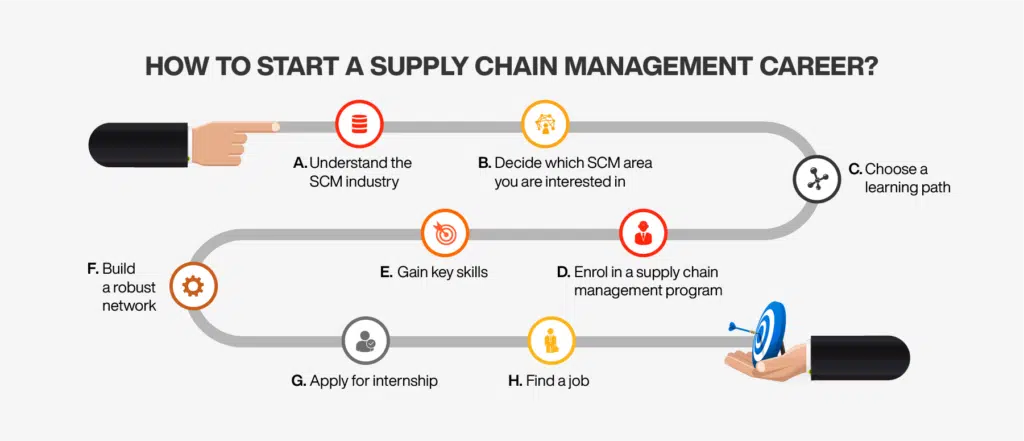
*OnlineManipal
Enter the Post Graduate Certificate Programme in Supply Chain Operations & Analytics (SCOA) by IIM Nagpur, with Jaro Education as the Marketing and Technology partner.
What Makes IIM Nagpur’s SCOA Programme Exceptional?
Here’s why you should consider this prestigious supply chain analytics course:
- Comprehensive Curriculum: Covers critical areas like demand planning, logistics, and advanced analytics.
- Industry-Expert Faculty: Learn from IIM Nagpur’s world-class faculty and leading industry professionals.
- Practical Learning: Apply your knowledge to real-world problems through case studies, projects, and simulations.
- Flexible Schedule: Designed for working professionals, it ensures you can learn while you work.
- Networking Opportunities: Connect with peers and industry leaders to open new career doors.
- Career Assistance: Jaro Education provides services such as resume building, LinkedIn profile optimization and career advancement sessions to propel your career to new heights.
A Step Towards the Future
The intersection of e-commerce and supply chain management represents one of the most exciting fields in today’s business world, e-supply chain management. As businesses strive to meet evolving customer demands, professionals with expertise in e-supply chain management and analytics will play a pivotal role in shaping the future.
The Post Graduate Certificate Programme in Supply Chain Operations & Analytics (SCOA) by IIM Nagpur offers the perfect opportunity to stay ahead of the curve. With its robust curriculum and focus on real-world applications, it’s your gateway to a thriving career in the field.
Don’t just adapt to change; lead it. Enrol today and redefine your professional journey in the world of e-supply chain management!
Frequently Asked Questions
- E-supply chain management refers to the integration of electronic technologies and digital processes into traditional supply chain operations. It leverages tools like cloud computing, big data analytics, artificial intelligence, and the Internet of Things (IoT) to optimise the flow of goods, information, and finances across the supply chain.
- This approach transforms conventional supply chains into highly efficient, data-driven ecosystems. E-supply chain management aims to improve responsiveness, reduce costs, and enhance collaboration among suppliers, manufacturers, distributors, and customers.
Online supply chain management involves managing supply chain activities through internet-based platforms and digital tools. It ensures seamless coordination of operations such as procurement, inventory management, logistics, and customer service via online systems.
- Key features of online supply chain management include:
- Real-Time Communication: Digital platforms enable instant collaboration across global supply chains.
- Transparency: Tools like blockchain and IoT allow tracking and monitoring of goods in real time.
- Scalability: Cloud-based systems support scaling operations during peak demand periods.
- Cost Efficiency: Automation and online tools minimise manual errors and reduce operational costs.
Online supply chain management is especially critical for e-commerce businesses that depend on digital infrastructure to meet customer expectations for speed and reliability.
An e-business in supply chain management refers to a company that conducts supply chain operations primarily through electronic means. This includes online platforms, digital communication tools, and automated systems for managing the procurement, production, distribution, and delivery of goods and services.
- Examples of e-businesses in supply chain management include:
-
- E-commerce Giants: Companies like Amazon and Flipkart use advanced e-supply chain strategies to handle online orders, inventory, and logistics.
- Digital Platforms: Businesses offering cloud-based supply chain solutions, such as SAP and Oracle, enable seamless supply chain management.
- Marketplaces: Platforms like Alibaba connect suppliers and buyers globally, facilitating trade and logistics.
-
In essence, e-businesses streamline the supply chain by eliminating geographical barriers, enhancing visibility, and improving the overall customer experience.





